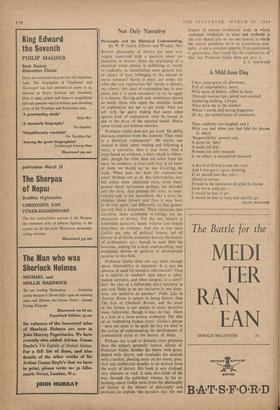Not Only Narrative
Philosophy and the Historical Understanding. By W. B. Gallie. (Chalk) and Windus, 30s.)
RECENT philosophy of history has been very largely concerned with a question about 'ex- planation in history. Does the explaining of a historical event consist in exhibiting it, tacitly or explicitly, as instantiating some general law, or cluster of laws, belonging to the natural or social sciences? Surely it must. say some; for what else can explanation be? Surely it doesn't, say others: this ideal of explanation has its own place, but it is quite unrealistic to try to apply it in history. Having said, and, sometimes, shown so much, those who reject the scientific model of explanation are apt to get stuck. They are left with the guilty feeling that some other special kind of explanation must be found to put in the place of the rejected model. Hence some forced and dubious theories.
Professor Gallie does not get stuck. He deftly distracts attention from the insistent 'Then what is a historical explanation?' He invites one instead to think about reading and following a story, a narrative; then a true story, then a story based on evidence, a story which is follow- able, though the teller does not select from his facts, his evidence, in ways such that, if we knew of them, we should say he was distorting the truth. When does the need for explanations arise? Perhaps not at all. But followability may fail unless some additional facts, some back- ground about institutions perhaps, are intruded into the story. And perhaps the story, as tradi- tionally told, is too marvellous, like a story for children about heroes; and then it may have to be told again, and differently, so that grown- ups will find it acceptable. These intrusions into narrative, these acceptable re-tellings, are ex- planations in history. For the rest, history is followable narrative, based, without (one hopes) distortion, on evidence. And this is true (says Gallie) not only of political history, but of history of all kinds, economic history, the history of architecture, etc.; though in each field the historian, seeking for a deep understanding, may emphasise themes or patterns of development peculiar to that field.
Professor Gallie does not say quite enough about followability in narrative. Is it, just the absence of need for intrusive information? Then is it relative to readers? And when is infor- mation intrusive, and when integral, to a story? Isn't the idea of a followable (etc.) narrative in any case likely to be too exclusive in one direc- tion, too inclusive in another? Daily Life in Ancient Rome is nearer to being history than The Life of Charlotte Bronte; and the point of the former is not merely to make narrative more followable, though it may do that. There is a hint of a more serious confusion. The idea of an 'enthralling human story'—Gallie's phrase --does not seem to be quite the key we need to the notion of understanding the development of architectural styles or the history of music.
Perhaps one is apt to demand more precision than the subject, generally treated, admits of. Professor Gaulle handles his theme with grace, indeed with charm, and concludes his analysis with a modest, pleasing essay on the moral, prac- tical and intellectual benefits to be derived from the study of history. His book is very civilised, very pleasant to read. It ends two-thirds of the way through the published volume. In the re- maining essays Gallie turns from the philosophy of history to the history of philosophy and promises to explain 'the paradox that the one
branch of serious intellectual study in which continual revolution in aims and methods is the rule should also be the one branch in which the central problems show an astonishing simi- larity. if not a complete identity, from generation t',) generation.' One would like the explanation of that, but Professor Gallie does not give it.
P. F. STRAWSON








































 Previous page
Previous page